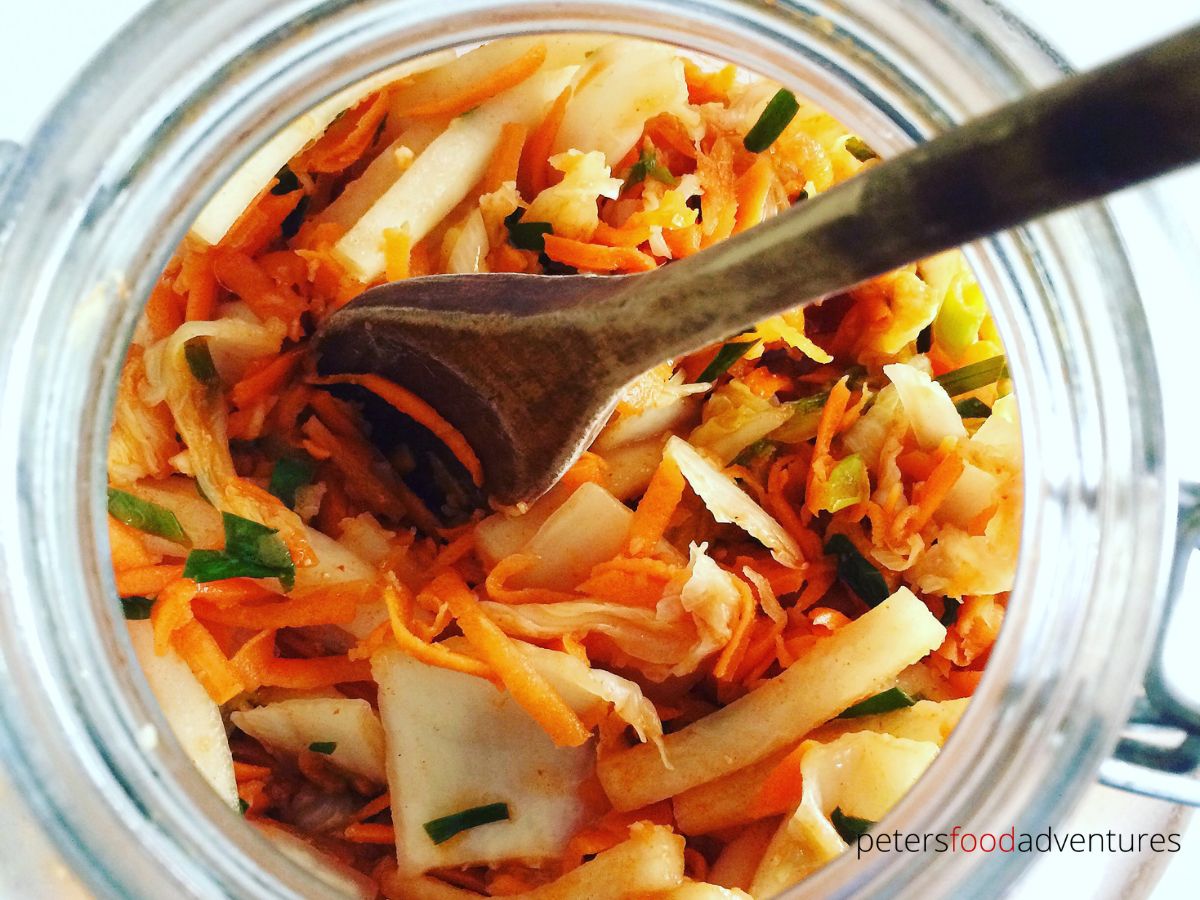Its really easy to follow this Fermented Korean Kimchi Recipe, and your health will thank you. Naturally fermented, full of probiotics and vitamins. Made with spicy Gochujang Red Chili Paste.
Its really easy to follow this Fermented Korean Kimchi Recipe, and your health will thank you. When I was young I felt invincible, eating whatever I liked, usually. As I grew older and maybe wiser and couldnt keep up with the twenty-somethings anymore, my interest in health miraculously came alive. So how can I combine my love of cooking with the added benefits of probiotics and natural health?
A Korean Kimchi recipe. I love spicy foods and Asian foods, so this is a marriage made in heaven for me! Koreans have eaten Kimchee for over a thousand years, and annually eat over 40 pounds per person! Lucky for me, its not hard to make, lasts a long time, and I believe will improve my health and boost my immune system. The best part is because I made it, I know exactly what went into it. And it makes a delicious Kimchi Fried Rice recipe.
Kimchi Sauce Swaps. Gochugaru is pretty essential, but you can use gochujang instead, which is a Korean fermented chili paste. Try it with both.

Kimchi Recipe with Apple
I love this recipe because it doesnt add sugar or honey like some recipes, but naturally adds sweetness with a grated apple. (You could substitute grated pear or nashi pear instead). Thats the secret to an authentic Kimchee. I used a lot of carrots in this recipe, as the carrots I bought were some giant carrots, so I used them all as I dont like wastage. The photos are very carrot heavy, in hindsight, I should have used less carrot due to the physical size of the carrots.
So what do I do with all this Kimchi? I love adding my Korean Kimchi recipe to my chicken burgers, or you can just eat it as a side with your meal. Plus it makes a killer Kimchi Fried Rice which tastes amazing.
Kimchi Recipe with Gochujang Paste
Traditionally Kimchi is made by covering the whole pieces of napa cabbage with the spicy Gochujang paste, or Gochugaru (red pepper flakes). Either spice will work, I use the paste. I prefer to chop the cabbage into small manageable pieces. This doesnt impact the fermentation in any way, its just easier to use as a condiment. You can find Gochujang at any Asian grocer. More and more supermarkets are carrying it in stock now.
In my pantry I had a 1 kg bag of Himalayan Salt, and that is perfectly acceptable to use instead of regular salt. As I always say, use what youve got! If sodium levels are a concern in your diet, use kosher salt, as it has a lower milligram amount of sodium vs regular salt. I think theres no escaping the salt required in this recipe.

How to make KIMCHI using Gochujang red pepper paste || Aabbyy Perez
FAQ
Can I use gochujang instead of gochugaru?
Can I use gochujang instead of gochugaru for cucumber kimchi?
Is gochujang same as kimchi?
Can you add gochujang to kimchi?
Adding gochujang to kimchi gives it a spicy and flavorful kick. Here’s how you can make your own kimchi with gochujang at home. To make kimchi with gochujang, you’ll need Napa cabbage, Korean radish, scallions, garlic, ginger, sea salt, sugar, fish sauce, and, of course, gochujang.
What is the difference between gochujang and kimchi?
Gochujang is a red chili paste made from fermented soybeans, red chili powder, glutinous rice, and salt. It is primarily used as a seasoning in marinades, stews, dipping sauces, and as a condiment for grilled meat. On the other hand, kimchi is a traditional Korean side dish made from fermented vegetables, typically napa cabbage or radish.
What does gochujang taste like?
The use of gochujang is widely accepted, and in fact, many Korean households use it in their own kimchi recipes. Gochujang’s unique blend of sweet, savory, and spicy flavors makes it a perfect ingredient to add depth to kimchi’s flavor profile. Its rich umami taste pairs well with the sourness of the kimchi and adds a smoky, earthy undertone.
What is gochujang?
Gochujang is a red chili paste that also contains glutinous rice, fermented soybeans, salt, and sometimes sweeteners. It’s a thick, sticky condiment that’s spicy and very concentrated and pungent in flavor.
